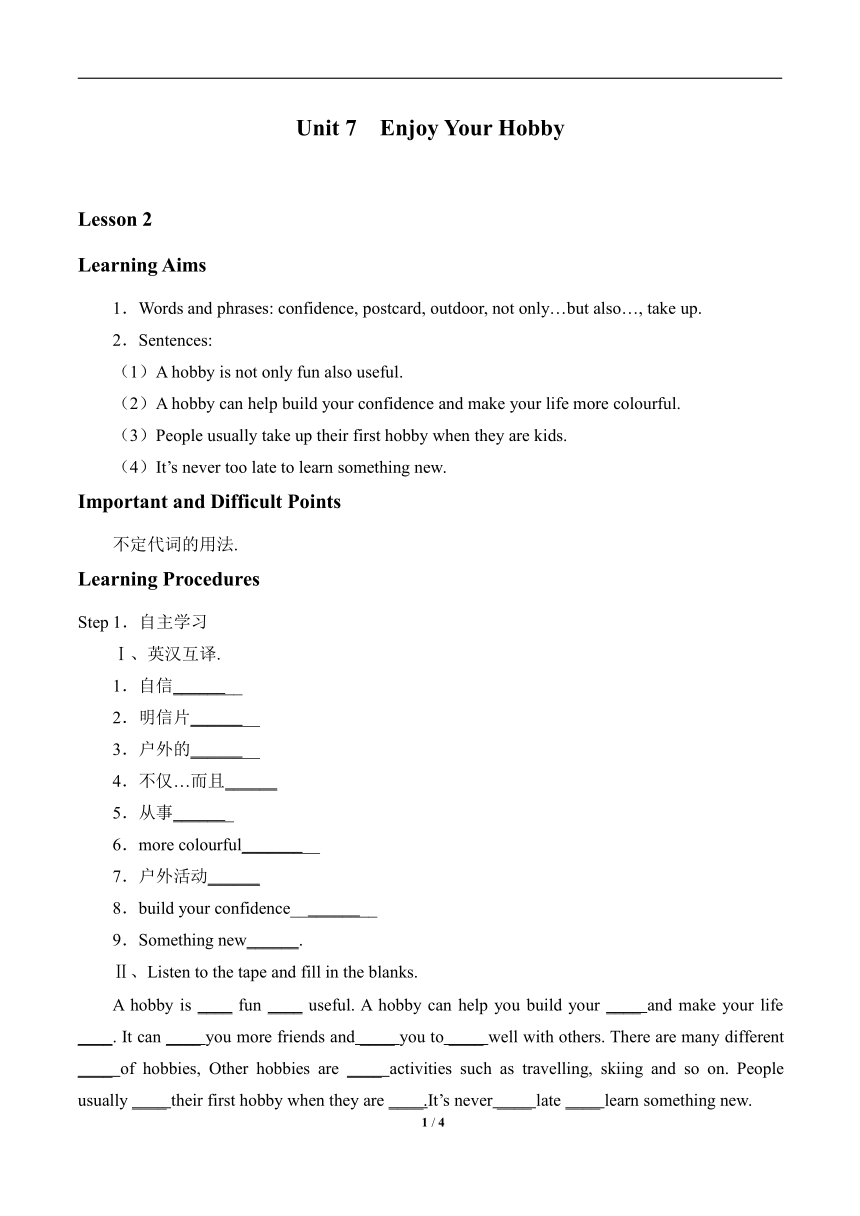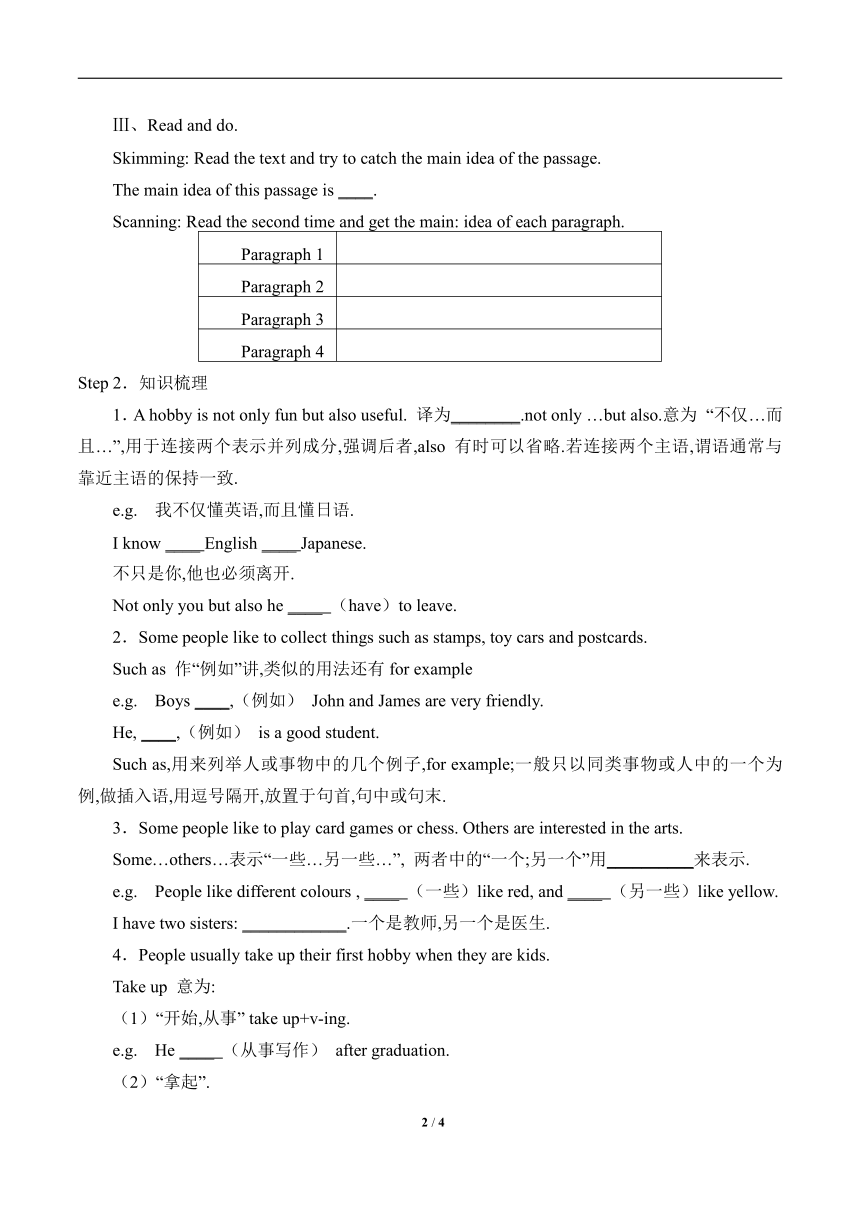冀教版英语八年级上册Unit 7 Enjoy Your Hobby学案2(无答案)
文档属性
| 名称 | 冀教版英语八年级上册Unit 7 Enjoy Your Hobby学案2(无答案) |

|
|
| 格式 | doc | ||
| 文件大小 | 25.0KB | ||
| 资源类型 | 教案 | ||
| 版本资源 | 冀教版 | ||
| 科目 | 英语 | ||
| 更新时间 | 2024-09-27 21:01:43 | ||
图片预览


文档简介
Unit 7 Enjoy Your Hobby
Lesson 2
Learning Aims
1.Words and phrases: confidence, postcard, outdoor, not only…but also…, take up.
2.Sentences:
(1)A hobby is not only fun also useful.
(2)A hobby can help build your confidence and make your life more colourful.
(3)People usually take up their first hobby when they are kids.
(4)It’s never too late to learn something new.
Important and Difficult Points
不定代词的用法.
Learning Procedures
Step 1.自主学习
Ⅰ、英汉互译.
1.自信________
2.明信片________
3.户外的________
4.不仅…而且______
5.从事_______
6.more colourful_________
7.户外活动______
8.build your confidence__________
9.Something new______.
Ⅱ、Listen to the tape and fill in the blanks.
A hobby is ____ fun ____ useful. A hobby can help you build your ____ and make your life ____. It can ____ you more friends and ____ you to ____ well with others. There are many different ____ of hobbies, Other hobbies are ____ activities such as travelling, skiing and so on. People usually ____ their first hobby when they are ____.It’s never ____ late ____ learn something new.
Ⅲ、Read and do.
Skimming: Read the text and try to catch the main idea of the passage.
The main idea of this passage is ____.
Scanning: Read the second time and get the main: idea of each paragraph.
Paragraph 1
Paragraph 2
Paragraph 3
Paragraph 4
Step 2.知识梳理
1.A hobby is not only fun but also useful. 译为________.not only …but also.意为 “不仅…而且…”,用于连接两个表示并列成分,强调后者,also 有时可以省略.若连接两个主语,谓语通常与靠近主语的保持一致.
e.g. 我不仅懂英语,而且懂日语.
I know ____ English ____ Japanese.
不只是你,他也必须离开.
Not only you but also he ____ (have)to leave.
2.Some people like to collect things such as stamps, toy cars and postcards.
Such as 作“例如”讲,类似的用法还有for example
e.g. Boys ____,(例如) John and James are very friendly.
He, ____,(例如) is a good student.
Such as,用来列举人或事物中的几个例子,for example;一般只以同类事物或人中的一个为例,做插入语,用逗号隔开,放置于句首,句中或句末.
3.Some people like to play card games or chess. Others are interested in the arts.
Some…others…表示“一些…另一些…”, 两者中的“一个;另一个”用__________来表示.
e.g. People like different colours , ____ (一些)like red, and ____ (另一些)like yellow.
I have two sisters: ____________.一个是教师,另一个是医生.
4.People usually take up their first hobby when they are kids.
Take up 意为:
(1)“开始,从事” take up+v-ing.
e.g. He ____ (从事写作) after graduation.
(2)“拿起”.
she _____(拿起)the book and began to read.
(3)“接纳,采纳”.
He ______ (采纳)my suggestion .
5.It’s never too late to learn something new. 学习一些新东西从来不会晚.
(1)too...to 意为“太…而不能….”.
e.g. It’s never ____(太老而不能学习)
(2)something new “一些新东西” 形容词修饰something, anything, nothing,等不定代词时,要放在这些词的后面.
e.g. I have (重要的事)to tell you.
There is (没有错)with you.
Step 3.self-assessment
1.The club provides different kinds of activities, ____ tennis, swimming and chess.( )
A.such
B.such as
C.for example
D.for
2.Is there ____ in today’s newspaper ( )
A.something new
B.new something
C.anything new
D.new anything
3.He works ____ on weekdays ____ on Sundays. ( )
A.only; but
B.only; and
C.not; but
D.new anything
4.A dictionary is very ____. It can help me a lot ____ my English. ( )
A.use; but
B.use; and
C.useful; on
D.useful; with
5.—You’re ____ old ____ enjoy a card game. ( )
—Really I’ll try it!
A.never to; too
B.never too; to
C.always to; too
D.always too; too
Step 4.Learning summary
What have you learned in this class Please write down.
3 / 4
Lesson 2
Learning Aims
1.Words and phrases: confidence, postcard, outdoor, not only…but also…, take up.
2.Sentences:
(1)A hobby is not only fun also useful.
(2)A hobby can help build your confidence and make your life more colourful.
(3)People usually take up their first hobby when they are kids.
(4)It’s never too late to learn something new.
Important and Difficult Points
不定代词的用法.
Learning Procedures
Step 1.自主学习
Ⅰ、英汉互译.
1.自信________
2.明信片________
3.户外的________
4.不仅…而且______
5.从事_______
6.more colourful_________
7.户外活动______
8.build your confidence__________
9.Something new______.
Ⅱ、Listen to the tape and fill in the blanks.
A hobby is ____ fun ____ useful. A hobby can help you build your ____ and make your life ____. It can ____ you more friends and ____ you to ____ well with others. There are many different ____ of hobbies, Other hobbies are ____ activities such as travelling, skiing and so on. People usually ____ their first hobby when they are ____.It’s never ____ late ____ learn something new.
Ⅲ、Read and do.
Skimming: Read the text and try to catch the main idea of the passage.
The main idea of this passage is ____.
Scanning: Read the second time and get the main: idea of each paragraph.
Paragraph 1
Paragraph 2
Paragraph 3
Paragraph 4
Step 2.知识梳理
1.A hobby is not only fun but also useful. 译为________.not only …but also.意为 “不仅…而且…”,用于连接两个表示并列成分,强调后者,also 有时可以省略.若连接两个主语,谓语通常与靠近主语的保持一致.
e.g. 我不仅懂英语,而且懂日语.
I know ____ English ____ Japanese.
不只是你,他也必须离开.
Not only you but also he ____ (have)to leave.
2.Some people like to collect things such as stamps, toy cars and postcards.
Such as 作“例如”讲,类似的用法还有for example
e.g. Boys ____,(例如) John and James are very friendly.
He, ____,(例如) is a good student.
Such as,用来列举人或事物中的几个例子,for example;一般只以同类事物或人中的一个为例,做插入语,用逗号隔开,放置于句首,句中或句末.
3.Some people like to play card games or chess. Others are interested in the arts.
Some…others…表示“一些…另一些…”, 两者中的“一个;另一个”用__________来表示.
e.g. People like different colours , ____ (一些)like red, and ____ (另一些)like yellow.
I have two sisters: ____________.一个是教师,另一个是医生.
4.People usually take up their first hobby when they are kids.
Take up 意为:
(1)“开始,从事” take up+v-ing.
e.g. He ____ (从事写作) after graduation.
(2)“拿起”.
she _____(拿起)the book and began to read.
(3)“接纳,采纳”.
He ______ (采纳)my suggestion .
5.It’s never too late to learn something new. 学习一些新东西从来不会晚.
(1)too...to 意为“太…而不能….”.
e.g. It’s never ____(太老而不能学习)
(2)something new “一些新东西” 形容词修饰something, anything, nothing,等不定代词时,要放在这些词的后面.
e.g. I have (重要的事)to tell you.
There is (没有错)with you.
Step 3.self-assessment
1.The club provides different kinds of activities, ____ tennis, swimming and chess.( )
A.such
B.such as
C.for example
D.for
2.Is there ____ in today’s newspaper ( )
A.something new
B.new something
C.anything new
D.new anything
3.He works ____ on weekdays ____ on Sundays. ( )
A.only; but
B.only; and
C.not; but
D.new anything
4.A dictionary is very ____. It can help me a lot ____ my English. ( )
A.use; but
B.use; and
C.useful; on
D.useful; with
5.—You’re ____ old ____ enjoy a card game. ( )
—Really I’ll try it!
A.never to; too
B.never too; to
C.always to; too
D.always too; too
Step 4.Learning summary
What have you learned in this class Please write down.
3 / 4
同课章节目录
- Unit 1 Me and My Class
- Lesson 1 Back to School!
- Lesson 2 Many Faces, One Picture
- Lesson 3 Getting to Know You!
- Lesson 4 Best Friends
- Lesson 5 Meet Ms. Liu
- Lesson 6 Jenny's Week
- Unit 2 My Favourite School Subject
- Lesson 7 Don't Be Late for Class!
- Lesson 8 E-mail Helpers!
- Lesson 9 I Don't Want to Miss Geography !
- Lesson 10 Looking for Lisa
- Lesson 11 Lily Learns about China !
- Lesson 12 Karen's Hair Stood Up!
- Unit Review
- Unit 3 Families Celebrate Togethe
- Lesson 13 I Love Autumn
- Lesson 14 Happy Memories
- Lesson 15 A Present for Li Ming!
- Lesson 16 Happy Thanksgiving!
- Lesson 17 Presents from Canada!
- Lesson 18 Li Ming's Birthday
- Unit Review
- Unit 4 My Neighbourhood
- Lesson 19 The Best Neighourhood
- Lesson 20 No Stopping!
- Lesson 21 Eat a Donut and Turn Right
- Lesson 22 I Like My Neighbourhood
- Lesson 23 People in My Neighbourhood
- Lesson 24 I Need a Map!
- Unit Review
- Unit 5 My Future
- Lesson 25 I Want to Be a Teacher!
- Lesson 26 What Will I Be ?
- Lesson 27 What's Your Advice?
- Lesson 28 Rich or Poor? It Doesn't Matter!
- Lesson 29 Our Ambitions and Dreams
- Lesson 30 A Famous Friend?
- Unit Review
- Unit 6 Go With Transportation !
- Lesson 31 How Do You Travel ?
- Lesson 32 Trains Go Faster !
- Lesson 33 Life on Wheels
- Lesson 34 Flying Donuts
- Lesson 35 Future Transportation
- Lesson 36 Clean Cars ?
- Unit Review
- Unit 7 Enjoy Your Hobby
- Lesson 37 What's Your Hobby ?
- Lesson 38 Hobbies Are Fun!
- Lesson 39 Danny's Hobby
- Lesson 40 What's Paul's Hobby?
- Lesson 41 Show and Tell!
- Lesson 42 The New Club
- Unit Review
- Unit 8 Celebrating Me
- Lesson 43 What Makes You Unique?
- Lesson 44 Georgia Plays Basketball
- Lesson 45 Be Yourself !
- Lesson 46 My Dream
- Lesson 47 I Made It !
- Lesson 48 Li Ming's Report
- Unit Review
